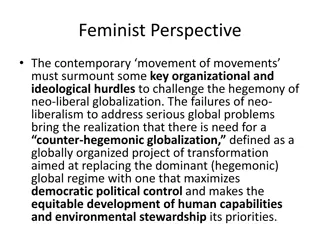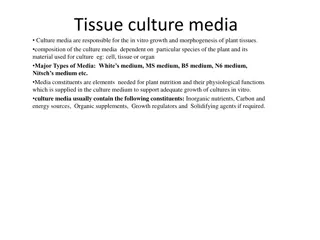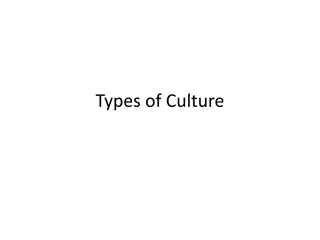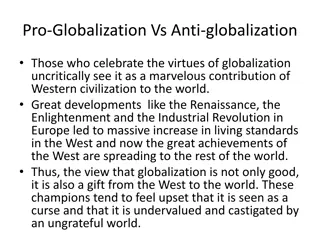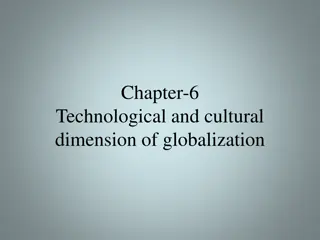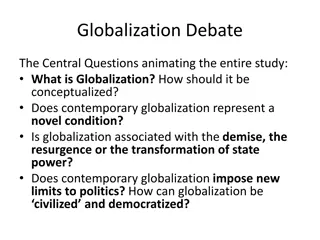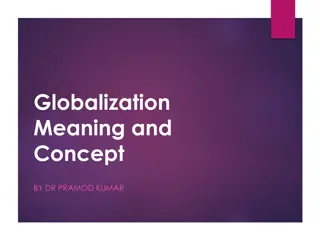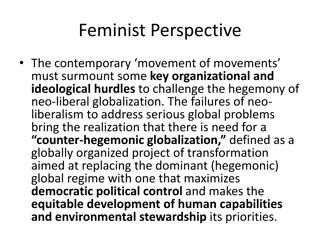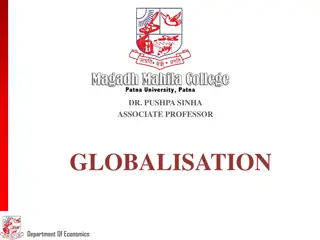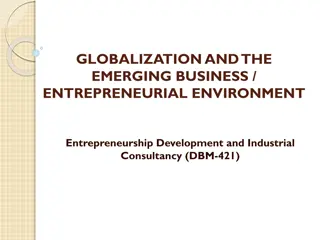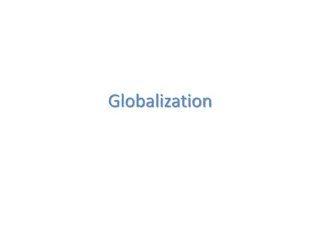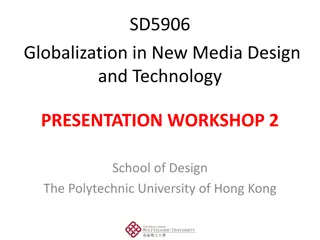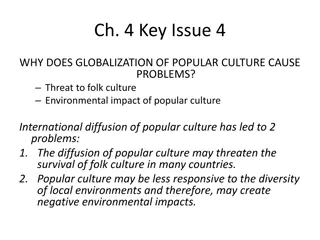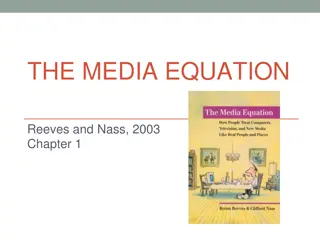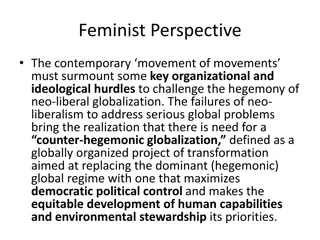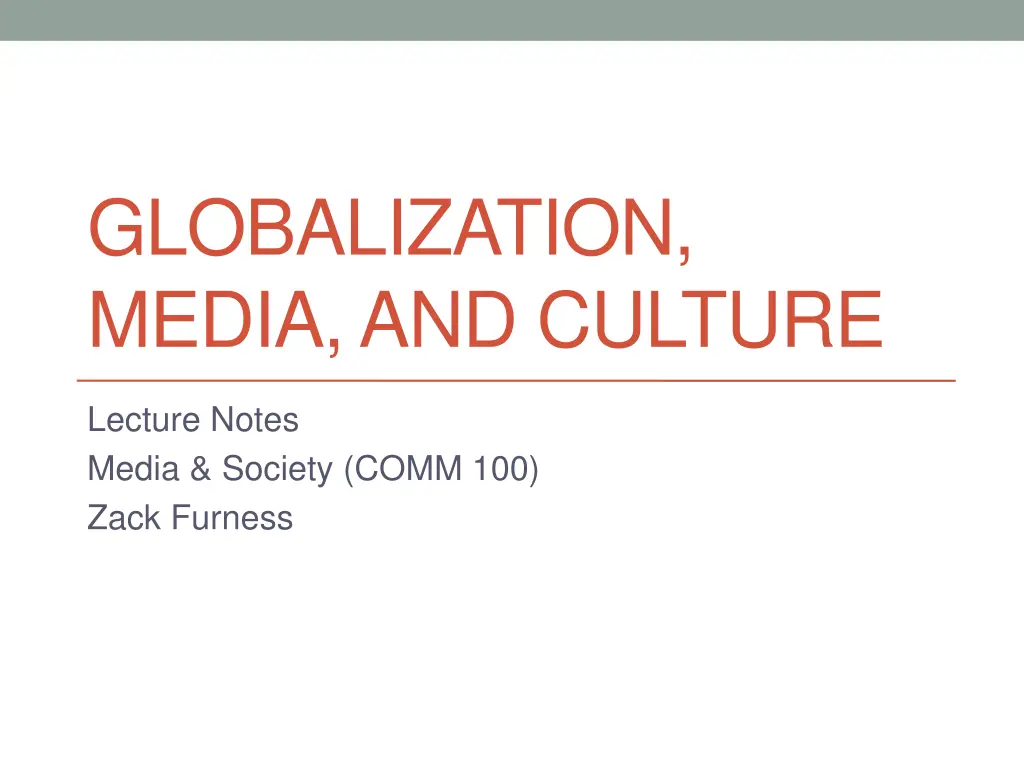
Understanding Globalization, Media, and Culture Impact
Explore the intricate relationship between globalization, media, and culture, delving into how multinational corporations, powerful trade organizations, and interdependence shape our world. Discover how media plays a pivotal role in globalization, making cultural content more accessible and driving global expansion. Learn about Marshall McLuhan's visionary insights on the global village and the centralized ownership of the global media industry.
Download Presentation

Please find below an Image/Link to download the presentation.
The content on the website is provided AS IS for your information and personal use only. It may not be sold, licensed, or shared on other websites without obtaining consent from the author. If you encounter any issues during the download, it is possible that the publisher has removed the file from their server.
You are allowed to download the files provided on this website for personal or commercial use, subject to the condition that they are used lawfully. All files are the property of their respective owners.
The content on the website is provided AS IS for your information and personal use only. It may not be sold, licensed, or shared on other websites without obtaining consent from the author.
E N D
Presentation Transcript
GLOBALIZATION, MEDIA, AND CULTURE Lecture Notes Media & Society (COMM 100) Zack Furness
Globalization can be defined as A set of postmodern (i.e. post-Fordist) economic practices Multinational corporations Decline of the nation-state Rise of powerful trade & lending organizations Flexible production Described by some as a characteristic of late capitalism.
Globalization also defined as The process by which regional economies, societies, and cultures have become integrated through a global network of ideas through communication, transportation, and trade Interdependence among the world Crossing the limits of time and space Crossing cultural boundaries Economic, cultural, political, media globalization
Globalization and Media Media at the center of globalization International communication networks Culture and media contents more accessible to a larger number of people The media industries are leaders in the push toward global expansion and integration Marshall McLuhan s vision of the global village McLuhan was a media theorist whose ideas about the global future of media technologies (several decades ago) shaped how people came to see the prospects of the Internet in the 1990s: We have extended our central nervous system itself in a global embrace. We have become irrevocably involved with, and responsible for, each other His vision remains relevant but largely unfulfilled
Marshall McLuhan 1962
The Global Village The next medium, whatever it is it may be the extension of consciousness will include television as its content, not as its environment, and will transform television into an art form. A computer as a research and communication instrument could enhance retrieval, obsolesce mass library organization, retrieve the individual's encyclopedic function and flip into a private line to speedily tailored data of a saleable kind (1962)
The Global Media Industry Global products, centralized ownership Ownership and control of media production are largely centralized in a few mega corporations The Big four media corporations dominate the global music industry Dominance of software companies Globalization of reality TV shows
The Cultural Imperialism Perspective Many have argued that globalization is really just the exportation of American and/or Western culture to other parts of the world. This process of Americanization / Westernization of culture has been described as a form of cultural imperialism because, according to proponent of this perspective, the economic and political power of Western countries allows them to saturate other countries with their cultural products (for ex. TV, film, fast food, etc.) in a way that is invasive and erodes the unique identities of other nations and national customs/traditions/practices. An example of this critique: Globalization is about the export of a monoculture. It is the death of human diversity (Ricklefs, 1998)
Globalization is Cultural Imperialism (?) Critics describe it as a form of neo-colonialism or cultural imperialism. This line of critique suggests that the cultural norms of the West, namely America, are exported throughout the globe and imposed upon people largely via the development, growth and consolidation of multinational corporations. A homogenizationof culture. However, global corporations also make use of cultural localization, sometimes called glocalization. For example: McDonalds menu items from around the world
Americanization, Westernization, McDonaldization? The idea that one particular culture (the US) plays leading and forceful role in global processes, and this particular local culture is American one.
For example This is the view of the pyramids in Giza, Egypt from the inside of the Pizza Hut that sits directly across the street, facing the Sphinx
The Cultural Imperialism Perspective Some arguments against the idea of globalization as cultural imperialism 1. The rise of non-American media companies and resources across the globe has been tremendous in recent years. 2. Like U.S. audiences, people in non-Western countries have their own filters that they use interpret Western media products they are not passive. People often pick and choose only those elements of Western culture that suit their own national cultures or indigenous customs. 3. Does not distinguish between different types of media and tends to ignore the influence of non-Western cultures on Western culture itself. 4. American / Western cultural appeal has diminished in many ways.
The Hybridization Thesis Many argue that globalization is a process of cultural hybridization, through which existing cultures mix and are transformed into something new. Despite the economic/political/military power of countries like the US (and, previously, France and the UK), dominant cultures tend to interact with local cultures, creating hybrid culture and media. Some refer to this process as glocalizationinstead of globalization. Glocalization = global + local For example:McDonalds menu items from around the world
Global Media Consumption Media are not equally accessible around the globe There is still a global digital divide that separates those who have access to the Internet, computer technologies and telecommunications infrastructures from those who do not.
Regulating Global Media Problems with regulating global media National governments and international organizations are pressured by media corporations who seek profit and fight against rules and regulations that inhibit their ability to do as they please. Global agreements on trade typically circumvent national regulations. This means that even when countries create laws to regulate private media corporations those same laws can be overruled by their international trade agreements. The borderless nature of the Internet makes it inherently difficult to regulate.





